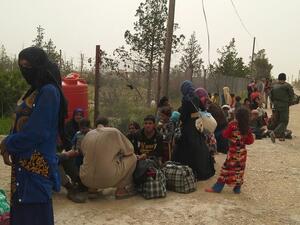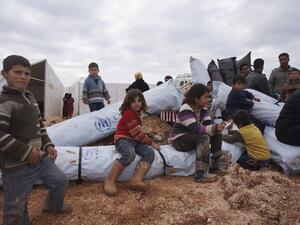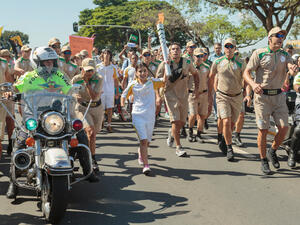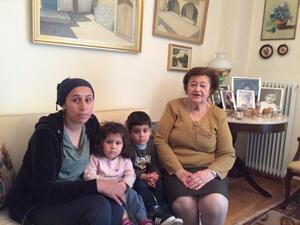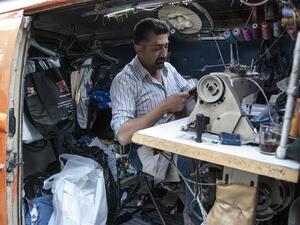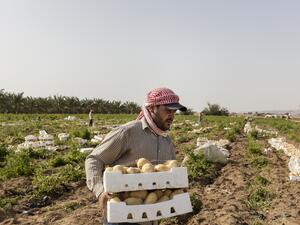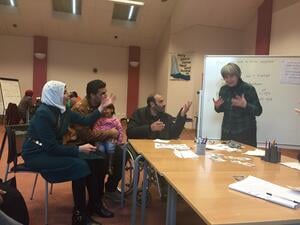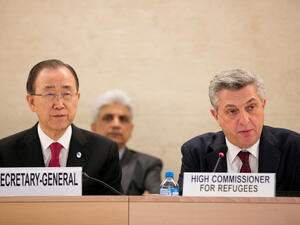UNHCR aid for 5,000 reaches cut-off region of northern Syria
UNHCR aid for 5,000 reaches cut-off region of northern Syria

UNHCR has been delivering aid to the needy inside Syria and in Lebanon, where these two Syrian ladies were photographed in the town of Tartus. UNNHC recently distributed financial assistance there.
GENEVA, June 14 (UNHCR) - The UN refugee agency has this week delivered vital aid to the northern Syria area of Al Raqqa, where the humanitarian situation is reported to be dire after being inaccessible for the past three months.
Taking advantage of a window of opportunity, UNHCR on Sunday and Wednesday sent a total of nine trucks filled with mattresses, blankets, hygiene kits and kitchen sets from Damascus. "Seven are confirmed to have reached Raqqa and confirmation is awaited for the last two. This assistance will help some 5,000 persons displaced in this area," UNHCR spokesperson Melissa Fleming told journalists in Geneva.
Also this week, UNHCR's team in Syria started distribution of financial help to displaced Syrian families in Tartus, a city on the Mediterranean coast. The displaced are from Aleppo, which is about 200 kilometres away. Families live in one of the collective shelters that UNHCR's team has visited and supported in Tartus since April.
Fleming said that as of Thursday, UNHCR has helped close to 800 displaced families (more than 3,200 people) out of a target of 1,110 families. All families have been selected according to their level of vulnerability. The average assistance amounts to US$150 per family. Surveys carried out by UNHCR earlier this year in Damascus and the surrounding Rif Dimashq governorate, during similar distributions, have shown that families were using the cash mainly for rent, fresh food and cooking gas.
After Damascus and Rif Dimashq, and Tartus this week, UNHCR is planning in the next months to help vulnerable displaced families with similar assistance in nine governorates across the country, starting with Homs and Damascus.
Meanwhile, UNHCR teams in Lebanon continue to register and assist refugees arriving from the western Syrian city of Al Qusayr, which government forces recently captured after fierce fighting.
Since the beginning of the crisis there, the municipality of Arsal has witnessed a regular influx of refugees through unofficial border crossing points in north-eastern Lebanon's Bekaa governorate, peaking in periods of increased violence across the border.
The offensive on Al Qusayr and the ensuing clashes and shelling of the villages around the strategic city, led to an increase in the average daily number of new arrivals in Arsal and reports of displacement within Syria. The period of the battle, from May 19 to June 6, saw a decrease in the number of new arrivals, which only rose again in the past week.
The civilian population that remained in Al Qusayr and surrounding villages was initially displaced within the conflict area itself. Many have since decided to cross the border into Lebanon. "Many told us they left family members behind with the intention of securing shelter before instructing them to cross the border," Fleming said.
Others initially left Al Qusayr with the intention of joining relatives or friends in Lebanon. A large number of families reportedly remain on the Syrian side of the border. Although they intend to travel into Lebanon, there is limited cross-border transportation capacity.
Fleming said that UNHCR and its partners were responding to the needs of the expanding population in coordination with local authorities and community-based organizations. Families are being provided with food kits and non-food help. There has been a substantial increase in the number of wounded, including 60 children.
"Families we spoke to describe a city reduced to rubble, devoid of any civilians and combatants," the spokesperson said. "One man we spoke to told us there was no food left in the town and no water. He said people were resorting to squeezing water from the leaves of trees," she added. During the fighting, people fled into the fields hoping the fighting would end and they could return home. Those who fled to Lebanon took a dangerous and indirect route to Arsal.
Although many of the new arrivals seem to be living with friends and relatives, finding suitable shelter remains the principal challenge for families choosing to stay in Arsal. Up to 20 families were staying in the municipal building's courtyard on a recent morning.
Large numbers of refugees are travelling onward to other towns in Lebanon. The exact number of new arrivals from Al Qusayr remains difficult to gauge as most families immediately depart with relatives to other areas in Lebanon. "UNHCR will commence the registration of new arrivals on Monday, which in turn should provide a clearer picture of the exact number of refugees in need of assistance," Fleming said.
All hope for an end to the war. "I dream about going home, but I cannot go home now," says Reema, whose home in Al Qusayr was destroyed. "I am alone here in Lebanon. I don't have anyone to support me," added the 25-year-old at a UNHCR reception centre in the Lebanese city of Tripoli.
Holding her two-year-old daughter, Reema says the infant trembles each time she hears the sound of gunfire or when she sees a plane overhead. Reema left Al Qusayr several weeks ago. Even then there was shooting near the frontlines of the conflict. "I want her to live a peaceful life far away from war," she says. "I want my child to have a comfortable life. But . . . she is traumatized by what she has seen and heard."

